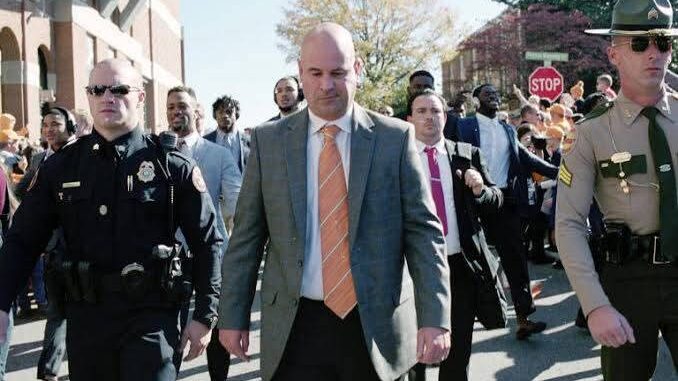
Former Tennessee Football Coach Jeremy Pruitt Files Landmark $100 Million Lawsuit Against NCAA, Alleges Conspiracy with University of Tennessee to Wrongfully Punish Him as the “Last Coach in America” for Impermissible Player Benefits
In a dramatic twist in the ongoing saga of NCAA regulations and collegiate athletics, former Tennessee Volunteers head football coach Jeremy Pruitt has filed a stunning $100 million lawsuit against the NCAA, claiming that the organization conspired with the University of Tennessee to unjustly penalize him. The legal filing, which has sent shockwaves through the college sports community, paints a picture of alleged wrongdoing that could have far-reaching implications for the NCAA’s governance and enforcement of its rules.
Pruitt, who was fired in January 2021 amid allegations of recruiting violations and impermissible benefits extended to players, argues in his lawsuit that he has been made an unfair scapegoat—the last coach in America to receive punitive measures for such infractions. He asserts that this punishment stems from a broader conspiracy between the NCAA and the university, which he claims sought to deflect blame and shield themselves from scrutiny regarding deeper systemic issues within their athletic program.
At the heart of Pruitt’s claims are allegations that the NCAA selectively enforced its rules, targeting him while allowing other institutions and coaches to escape similar fates. This has created a perception that he has been unjustly vilified while other prominent programs navigate violations without facing significant consequences. The lawsuit comes at a time when scrutiny of the NCAA’s enforcement practices is at an all-time high, with many questioning the organization’s ability to regulate fairness in college sports.
In the official court documents, Pruitt contends that his reputation has been irreparably damaged by the allegations lodged against him, and he has suffered significant financial losses as a result. He cites lost wages from his termination, as well as future earnings potential, stating that the emotional and professional toll has been immense. His legal team argues that the allegations are not only unfounded but that the NCAA’s actions have fundamentally undermined the integrity of collegiate athletics.
Pruitt’s tenure at Tennessee began with high expectations in 2018, as he was lauded for his previous success as Alabama’s defensive coordinator. However, his time with the Volunteers quickly unravelled amid a disappointing record and the fallout from investigation reports revealing recruiting infractions. The NCAA’s investigation concluded that Pruitt and his staff had engaged in actions that violated rules regarding improper benefits, including paying for meals and recruiting visits in violation of NCAA policy.
In his lawsuit, Pruitt highlights specific examples of what he purports to be unfair treatment and a lack of due process given to him by both the NCAA and the University of Tennessee. He argues that throughout the investigation, he was denied the opportunity to adequately defend himself and to challenge the nature of the alleged violations. Furthermore, he states that the university cooperated fully with the NCAA’s investigation, with only minimal emphasis placed on protecting his rights as a head coach.
Pruitt’s legal stance is bolstered by an increasing number of voices within college athletics who advocate for reform and a re-evaluation of how violations are handled. The environment in college sports has drastically evolved, particularly concerning player benefits and name, image, and likeness (NIL) rights. The allegations against Pruitt were centered around infractions that, in the current landscape of college athletics, might not even warrant such severe repercussions.
Moreover, Pruitt’s lawsuit has the potential to galvanize conversations on NCAA reform and accountability. His claims challenge the notion that the NCAA’s policies are uniformly applied, as well as the organization’s authority to impose sweeping punishments without substantial evidence correlating to significant wrongdoing. Critics of the NCAA have long accused the organization of inconsistent enforcement practices, leading to uneven consequences for coaches and players across different institutions.
As sports law experts analyze the implications of this lawsuit, the outcome could have broader repercussions for college athletics. Should Pruitt succeed in his claim, it could encourage other coaches and institutions to question NCAA regulations and challenge the authority of the governing body. On the flip side, a ruling against him could reaffirm the NCAA’s current policies and their capacity to enforce them without significant pushback.
For the University of Tennessee, this lawsuit comes at a challenging time as it works to rebuild its football program’s reputation post-Pruitt. The Volunteers have since hired new head coach Josh Heupel, and the focus remains on creating a successful culture moving forward. However, the legal battle ahead may threaten the stability the program seeks to achieve and could reopen wounds from the scandal that marred Pruitt’s tenure.
As the case unfolds, all eyes will be on how the NCAA responds to these allegations, the potential ramifications for the enforcement of its rules, and what this may mean for coaches and programs across the nation. The nexus of law, ethics, and college athletics is once again at the forefront of public discourse, with Pruitt’s lawsuit significantly contributing to the evolving landscape of collegiate sports governance. The outcome of this legal battle could very well be a defining moment in the ongoing struggle for fairness and accountability within the NCAA.
Leave a Reply